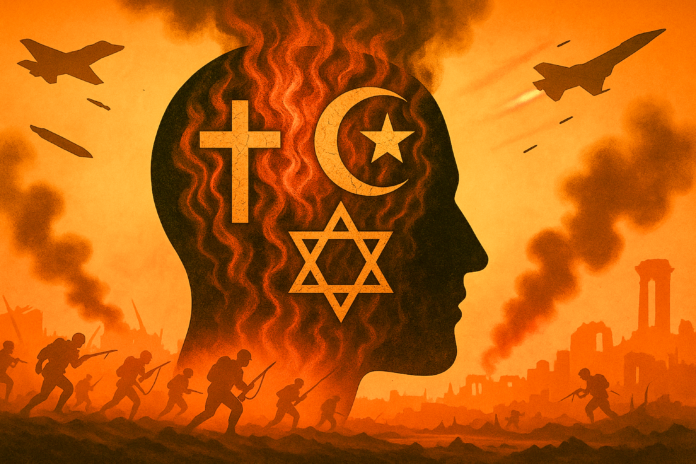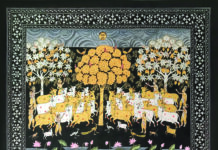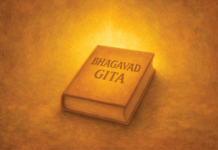When faith becomes identity, religion fuels conflict; true peace arises from self-awareness, not division or dogma-driven violence.
When the skies grow dark with smoke and the earth quakes beneath exploding shells, the world once again asks: Why does this never end? Why is war still so close, so constant, despite all our advancements?
These questions are not only for politicians or diplomats. They point to something far more fundamental—the human condition itself, and our tragic tendency to misuse the very forces that were meant to liberate us.
Religion, for instance, is meant to help us rise above base instincts, bring order to our inner chaos, and guide us from fear to clarity. But today, that same religion is often invoked to justify violence, hatred, and revenge. It is not the wise or the awakened who fuel wars. It is the unexamined mind, still trapped in primitive reflexes, now draped in ritual and symbolism. What was meant to elevate us has been turned into yet another instrument of division.
When Religion Becomes Identity
The causes of war are often framed as territorial disputes, economic tensions, or political rivalry. But these explanations miss something deeper, something older.
When religion ceases to be a path to inner clarity and becomes a banner of group identity, conflict takes a darker turn. The ‘other’ is no longer a fellow seeker, but a threat by mere existence. Understanding gives way to suspicion, and even peaceful coexistence is mistaken for weakness or compromise.
In many modern conflicts, this is the unspoken dynamic. Religious identity merges with national purpose, and every disagreement takes on theological proportions. Even moderation becomes suspect. A leader who once sought peace is branded a traitor. A neighbor becomes an enemy simply by virtue of who they worship.
On the other side, fear dominates. Fueled by collective memory and a lack of clarity, fear becomes the new reason to strike first. And so, aggression is renamed necessity, and violence gets dressed in the garb of duty. And yet both sides claim the blessings of the Divine. They forget: true religion does not teach fear. It teaches freedom from fear. It does not tell us whom to oppose—it teaches us to see clearly what we are.
The Global Echo of Inner Division
This confusion isn’t isolated. Across the globe, age-old tensions continue to play out under the guise of ideology or sovereignty. But beneath them all runs the same current: the human mind’s tendency to cling to identity and project it outward.
Take West Asia. The ongoing turmoil in the region is not merely about oil, borders, or influence. It is deeply theological. In the United States, evangelical Christians—around 25% of the electorate—hold a literal belief in Biblical prophecy. Their support for Israel is not only political but eschatological; they believe the Second Coming of Christ is predicated on the return of Jews to Israel. This belief subtly informs American foreign policy. On the other side, groups like Hamas describe their mission as jihad, not a political struggle, but a religious liberation of ‘Islamic land.’ Suicide bombers are exalted as martyrs, not merely fighters. When missiles are launched, verses from scripture are quoted. Religion, here, is not guiding peace—it is fueling a geopolitical fire.
Likewise, the Shia-Sunni schism continues to define rivalries across Iran, Saudi Arabia, Syria, Iraq, and Lebanon. Groups like Hezbollah (Shia) and ISIS or Al-Qaeda (Sunni) do not simply wage war; they frame it in the language of divine will. Their objectives are religious: the restoration of the Caliphate, the imposition of Sharia, or the purging of ‘apostates.’ Fatwas are issued to bless or condemn wars. Political decisions are sanctified with religious doctrine, and enemies are demonized not just as adversaries, but as heretics or infidels. The battlefields of today are not only territorial—they are scriptural.
Even symbolic acts, like naming a missile after a religious figure or a historic aggressor, or quoting scripture in political speeches, reveal how belief has been repurposed as justification for hostility. The sacred, once a call to introspection, is now enlisted in the machinery of ego-driven war.
What appears on the surface to be a clash over land, oil, or influence is deeply informed by religious convictions, some even messianic. Evangelical support in the West shapes global policies. Shia-Sunni rivalries fuel proxy wars. Militant factions define their objectives in scriptural terms. Suicide bombers are hailed as martyrs, and verses are quoted not for reflection, but for provocation.
And when that happens, theology overrides diplomacy. A conflict can no longer be resolved through reason, because it was never about reason to begin with. It was about the deep need to assert: We are right. We are chosen. The others are not.
This is not religion. It is ego wearing the mask of faith.
Common Roots, Bitter Divisions
It is astonishing how often groups that share spiritual ancestry end up in bitter conflict. They may honor the same prophets, share similar scriptures, and hold overlapping values—and yet, they fight.
Jerusalem, sacred to Jews, Christians, and Muslims alike, becomes a battlefield. The Temple Mount and Al-Aqsa Mosque are not just buildings—they are battlegrounds of identity. The irony is almost unbearable: in a city built to honor the Divine, the most blood is spilled in His name.”
What unites them—the core values, the shared origin—has faded. What remains are labels and customs: the robes, the rituals, the lines on a map. These outer forms, once secondary, now define identity. And when the essence is forgotten, division becomes destiny.
When origins are similar, identities become more desperate to distinguish themselves and conflict often follows. And so, paradoxically, the deepest hatred often arises between those who were once most alike.
The Illusion of Morality in Conflict
We often hear wars justified in moral terms: necessary, righteous, defensive. But mere superficial morality not arising from self-knowledge becomes a tool for self-justification.
Nature doesn’t follow morality. In the animal world, the strong dominate and the weak retreat. There is no code, only instinct. And when humans live without self-knowledge, we do the same. We speak of strategy, justice, even peace, but what drives us is often just fear, insecurity, and the need to dominate.
Throughout history, grand ideas have been used to conceal simple impulses. One calls it defense. Another, resistance. But under the surface, it is often the same old hunger—for control, for territory, for survival. This is what happens when the mind is not trained in self-observation. When instincts are allowed to parade as principles.
The Fallout of Misunderstood Religion
Seeing all this, it is understandable why many thoughtful people turn away from religion altogether. They look at the violence and superstition and say, “If this is religion, we want no part of it.” Some become atheists. Others grow indifferent.
But in turning away from this externalized and confused version of religion, they also turn away from its deeper possibility. They reject not just dogma, but the path of inner transformation itself. We must learn from what religion has become in parts of the Middle East. What began as teachings of surrender, compassion, and surrender to the Divine has been twisted into frameworks of control, hatred, and war. In India too, we must remain alert. The moment religion turns from a question into a banner, from a search into a slogan, we are no longer walking toward Truth—we are marching toward chaos.
This is the real tragedy: while one part of the world burns in religious frenzy, the other floats in indifference. Both remain disconnected from the real task: knowing themselves.
True religion is not about belief or belonging. It is about seeing. It is the rigorous inquiry into the self. Not worship of an external figure, but dissolution of the false within.
The Only War Worth Fighting
What, then, is the solution? More talks, more weapons, more treaties? None of that will help unless the individual transforms. The real battleground lies within—between our inherited prejudices and our capacity to question, between reacting out of fear and responding with awareness. No treaty can replace the discipline of honest self-observation.
We are not born human. We are born with the possibility of becoming human. That potential is not fulfilled by chance. It requires effort. Attention. Wisdom. To transcend is not to escape the world. It is to stop being ruled by fear and impulse. To move beyond the jungle mind that only knows attack or defense.
Even if only a few take this path, it is enough. Because real change begins with clarity, not with numbers. If a war must be waged, let it be for awakening—not against each other, but against the darkness within. The only revolution that truly matters begins in the one place we have long ignored: ourselves.
* Acharya Prashant, a Vedanta exegete and philosopher, is an author, columnist, and founder of the PrashantAdvait Foundation. He is a recipient of the Most Influential Vegan Award by PETA, the OCND Award from the IIT Delhi Alumni Association, and the Most Impactful Environmentalist Award by the Green Society of India.








